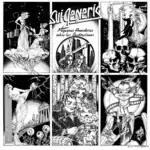Pequeñas anécdotas sobre las instituciones
Pequeñas anécdotas sobre las instituciones (Small Anecdotes about the Institutions) is the third album of Argentine group Sui Generis, released on 1974.
| Pequeñas anécdotas sobre las instituciones | ||||
|---|---|---|---|---|
 | ||||
| Studio album by | ||||
| Released | December, 1974 (Argentina) | |||
| Recorded | 1974 | |||
| Genre | Folk rock, progressive rock, progressive folk | |||
| Length | 40' 26" 48' 24" (1994's remastered version) | |||
| Label | Talent (4) | |||
| Producer | Charly García, Jorge Álvarez | |||
| Sui Generis chronology | ||||
| ||||
A concept album, it was originally meant to be titled "instituciones" (Institutions), but Sui Generis' producer suggested they change the name to "pequeñas Anécdotas sobre las Instituciones" (Little Anecdotes about the Institutions), reflecting the unstable nature of Argentine social and political institutions at the time. Charly García's concept was to write a song about every influential and traditional institution, including the Catholic Church, the government, the family, the judicial system, the police, the Army, and so on. Two tracks, "Juan Represión" ("John Repression") about the police and the peronist regime (and a specific reference to president Juan Domingo Perón), as well as "Botas locas" ("Crazy Boots") about the army, were eliminated from the album by the music label, who was concerned with the growing political violence at the time. Other tracks had to be partly changed, including "Las increíbles aventuras del Señor Tijeras" ("The incredible adventures of Mr. Scissors") about someone who controls film censorship, "¿Para quién canto yo entonces?" ("Who am I singing for, then?") also about censorship, and "Música de Fondo para Cualquier Fiesta Animada", which had to be completely rewritten.
When first released, the album wasn't as welcomed by the audience as its two predecessors had been. Though folk rock in nature, it contained aspects of progressive rock, a genre that wasn't too well known or accepted by the majority of listeners. With the passage of time, it would inspire new generations of Argentine musicians and become a classic in its own right. In 2007, the Argentine edition of Rolling Stone ranked it 31st on its list of "The 100 Greatest Albums of Argentine Rock".[1]
Track listing
All songs written by Charly García, except where noted.
Side One
- "Instituciones" (Institutions) - 4' 50"
- "Tango en segunda" - 3' 32"
- "El show de los muertos" (The Show of The Dead) - 6' 04"
- "Las increíbles aventuras del Señor Tijeras" (The Incredible Adventures of Mr. Scissors) - 5' 51"
Side Two
- "Pequeñas delicias de la vida conyugal" (Small Delights of the Spousal Life) - 3' 38"
- "El tuerto y los ciegos" (The One-Eyed and the Blind) - 2' 02"
- "Música de fondo para cualquier fiesta animada" (Background Music for Any Lively Party) - 4' 32"
- "Tema de Natalio" (Natalio's Theme) (García-Rafanelli) - 6' 00"
- "Para quién canto yo entonces" (Who am I Singing For, Then?) - 3' 42"
Bonus tracks on 1994 remastered version released by (Sony Music).
- "Juan Represión" (John Repression) - 3' 25"
- "Botas locas" (Crazy Boots) - 4' 58"
Album credits
The group
- Charly García - piano, electric piano, mini Moog, clavinet, ARP string ensemble, electric guitar, vocals
- Nito Mestre - acoustic guitar, recorder, vocals
- Rinaldo Rafanelli - bass, electric guitar, vocals
- Juan Rodríguez - drums, percussion
Guests
- David Lebón - electric guitar
- Alejandro Correa - bass
- Carlos Cutaia - organ
- Jorge Pinchevsky - violin
- León Gieco - harmonica
- Oscar Moro - drums
- María Rosa Yorio - chorus
- Billy Bond - chorus
Production
- Producer: Jorge Álvarez
- Engineer: Billy Bond
References
- "Los 100 mejores discos del rock nacional". Rolling Stone Argentina (in Spanish). Publirevistas S. A. April 2007.